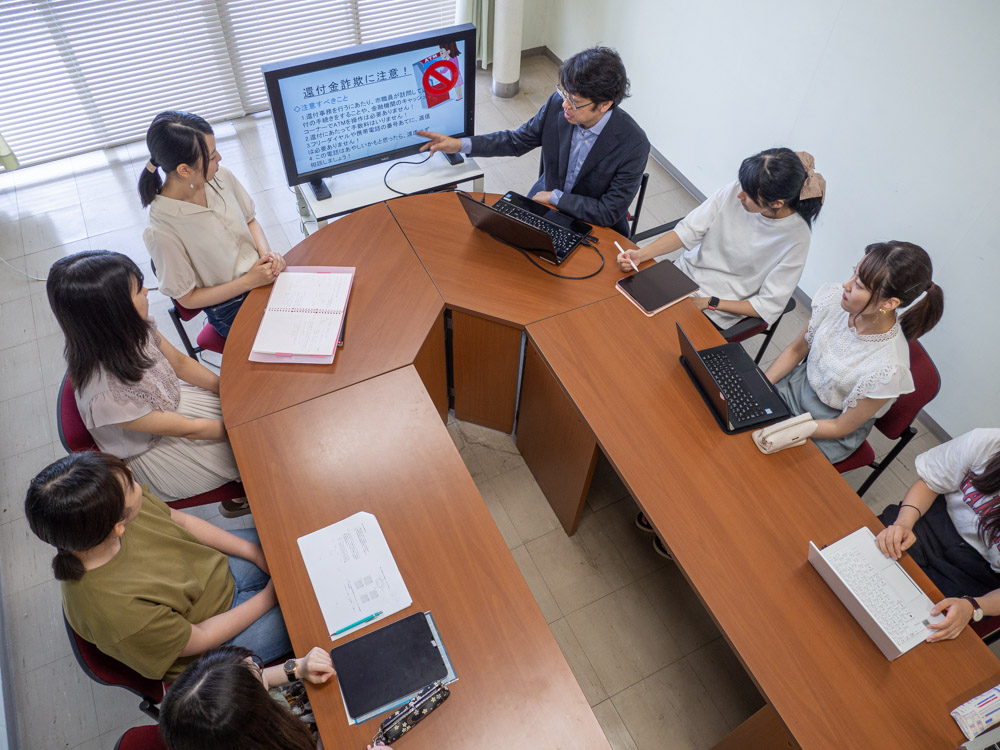Things you can learn
in the Culture and Humanities Course
Studying Culture and Humanities and Information and Communication Sciences from Multiple Perspectives
In the first and second grade, students are able to choose as many subjects as they like from both the Culture and Humanities and Information and Communication Sciences courses so as to develop cognitive abilities in both. Students learn about various social issues in their lives from the basics of data science.
Humanities and social sciences for problem-solving in accordance with Sustainable Development Goals
In the third and fourth grade, students will deepen their thinking for problem-solving further by attending various seminars as well as a seminar that focuses on writing a graduation thesis.
The SDGs are 17 common global goals set by the United Nations, including gender equality, good health and well-being, and climate action.
The faculty members of the Culture and Humanities Course specialize in various fields such as gender, consumer law, food economics, social psychology, and sociology. This enables us to approach the SDGs from various perspectives.
In Goal 11, for example, we learn about efforts to reduce the risk of disasters, including making cities inclusive, safe, resilient, and sustainable. In Goal 12, that is, ensuring sustainable consumption and production patterns, we study food loss, food safety, and laws to educate consumers. In Goal 13, namely, taking urgent action to combat climate change and its impacts, we focus on communication that promotes pro-environmental behavior from a social psychology perspective. Let us consider what other approaches are possible in the Life and Culture Studies course.

Click to zoom
Features of the Culture and Humanities Course
Multidisciplinary and practical learning
Multidisciplinary learning
Multidisciplinary means beyond the academic boundary.
In the Culture and Humanities Course, you will study social sciences, including law, economics, and sociology, humanities, for example, history and representational theory, and human sciences such as psychology. We also offer multidisciplinary studies such as gender. Students are also allowed to choose from basic subjects of information and communication sciences.
In this way, the Culture and Humanities Course sheds light on various aspects of life and examines the culture and humanities involved in our daily lives.
Practical learning
When you think of studying at a university, you may imagine yourself sitting in a large classroom and listening to talks presented by teachers. This is commonly known as a lecture. Although theory is important, an important aspect of Life and Culture Studies is that theory is examined in the context of actual living conditions and social issues are explored from the perspective of individuals.
Therefore, we use the following methods to conduct research: field surveys, observation surveys, questionnaire surveys, experiments, interviews, and literature studies. Students also learn to compare Japanese society with other cultures as well as compare cultures across different times.

Learn in small groups
In the second semester of the third year, students begin to participate in seminars to enable them to write a graduation thesis. The seminars are usually limited to five members per grade.
In the seminar, students decide on their own theme on which they conduct research to write a graduation thesis. The students remain in the same seminar so they can work on their own theme and have sufficient time to do so until they graduate. Since the seminar only involves a small group, the students have enough opportunities to discuss their work with the teachers.

Wide variety of gender-related subjects
The Culture and Humanities Course offers a wide variety of gender-related courses. These include gender and culture, gender theory, clothing and gender, and gender and culture seminar. The history of women’s life offers students the opportunity to study a subject from women’s perspective. By studying these subjects, which are rarely offered in co-educational universities, students can acquire perspectives of gender studies.

Teaching Staff
| Name | Links to research introduction site |
| Noriko Suzuki | https://researchmap.jp/haruou |
| Takashi Noda | https://researchmap.jp/read0011637 |
| Toshiko Hayashida | https://researchmap.jp/20041218 |
| Miho Mitsunari | https://researchmap.jp/read0188190 |
| Akiko Yamasaki | https://researchmap.jp/read0147728 |
| Kaori Ando | https://researchmap.jp/read0194938 https://www.researchgate.net/profile/Kaori-Ando-2 |
| Hiroshi Otsuka | https://researchmap.jp/read0194937 |
| Kayo Sawada | https://researchmap.jp/read0065012 |
| Misa Aoki | https://researchmap.jp/aokimisa |